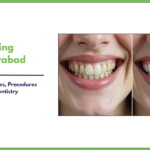Tooth decay is one of the most common dental issues affecting children and adults alike. Fortunately, modern dentistry offers a range of effective solutions to treat cavities and restore your oral health. In this guide, we’ll explore the best treatment options for cavities, from simple fillings to advanced restorative procedures, helping you make informed decisions with confidence.
If you’re looking for personalized care, Ocimum Dentistry – Best Dental Clinic in Jubilee Hills, offers expert diagnosis and tailored treatments using the latest dental technology.
What Is a Cavity?
A cavity is a permanently damaged area on the surface of your tooth that develops into tiny holes or openings due to plaque buildup and bacterial activity. If left untreated, it can lead to toothache, infection, and even tooth loss.
Common Causes of Cavities
Understanding the causes of cavities helps in prevention. Key factors include:
-
Poor oral hygiene
-
Sugary and acidic foods
-
Dry mouth
-
Infrequent dental visits
-
Genetics
Signs You Might Have a Cavity
Early detection is key. Look out for:
-
Tooth sensitivity to hot, cold, or sweet items
-
Visible holes or dark spots on the tooth
-
Pain when biting or chewing
-
Persistent toothache or discomfort
What Is the Best Treatment for Cavities?
The best treatment depends on the severity of the cavity. Here are the most common solutions:
Fluoride Treatment (For Early Decay)
If the cavity is in its earliest stage, fluoride can help remineralize the enamel and reverse the damage. Dentists may apply:
-
Prescription fluoride toothpaste
-
Fluoride gels or varnishes
-
Professional fluoride treatments
Dental Fillings
For minor to moderate decay, fillings are the most common solution. The decayed portion is removed and replaced with materials like:
-
Composite resin (tooth-colored)
-
Amalgam (silver)
-
Gold or ceramic
Dental Crowns
If the decay is extensive, a crown may be required to restore the tooth’s strength and function. This covers the entire tooth and is typically made from:
-
Porcelain
-
Metal
-
Porcelain-fused-to-metal (PFM)
Root Canal Therapy
When decay reaches the pulp (inner part of the tooth), a root canal is necessary to remove the infected tissue and save the tooth. It’s followed by a crown for protection.
Tooth Extraction
If a tooth is severely decayed and cannot be saved, extraction may be the only option. Replacement options include:
-
Dental implants
-
Bridges
-
Partial dentures
How to Prevent Cavities: Pro Tips from Dentists
-
Brush twice daily with fluoride toothpaste
-
Floss daily to remove food particles
-
Limit sugary and acidic snacks
-
Visit your dentist every 6 months
-
Consider dental sealants for added protection
When to See a Dentist
Don’t wait for pain to visit a dentist. Early cavities are painless but progress silently. Schedule an appointment if you notice:
-
Tooth sensitivity
-
Discoloration
-
Any discomfort or unusual changes
Cavities are preventable and treatable—especially when caught early. From fluoride treatments to root canals, today’s dental solutions are safe, effective, and often painless. Consult your dentist to determine the best treatment for your cavities and take a proactive step toward lasting oral health.
For expert care and advanced treatment options, trust Ocimum Dentistry – Best Dental Clinic in Jubilee Hills, where your smile is always in safe hands.





